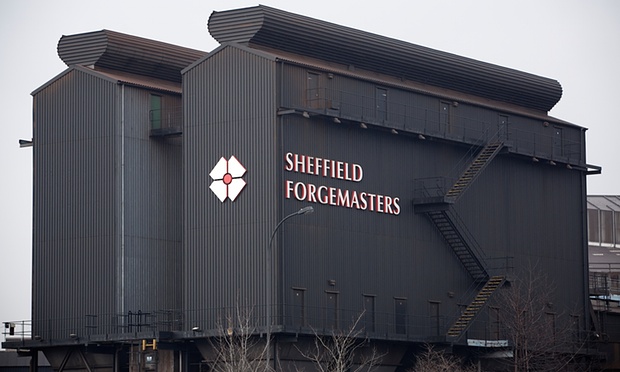Sheffield Forgemasters to cut up to 100 jobs as steel industry decline continues

Firm makes announcement days after Tata Steel said it plans to cut 1,050 UK jobs, with both criticising the government
The crisis engulfing British steelmakers has deepened, after Sheffield Forgemasters unveiled plans to cut up to 100 jobs.
The proposal prompted fresh criticism of the government’s response to the steel industry’s decline, just a day after Tata Steel announced plans to cut 1,050 jobs.
In a statement, the company said it would consult on “up to 100 redundancies across all its divisions”. Founded in 1805, Sheffield Forgemasters has nearly 800 staff.
Chairman Tony Pedder said: “The storm clouds which seem to gather periodically over the steel and steel-related sectors are once again evident.”
Sheffield Forgemasters, a private company which makes parts for the submarines carrying the UK’s Trident nuclear weapons, has also reported its first ever loss, of £9.4m, for the 18 months to the end of 2014.
The fresh blow to British steelmaking, which has shed 5,000 jobs since last summer, comes with the industry battling an array of problems.
These include high energy prices, the strong pound and alleged “dumping” of cheap steel in the EU by firms from China, where demand has slumped amid an economic slowdown.
But industry figures said the government had not done enough to help shore up steelmaking against the difficult conditions facing the industry.
“These significant job losses for the company highlight that there isn’t an area of steel that is off limits to the mix of extreme pressures the sector is facing.” said Gareth Stace, director of UK Steel.
He said it was “deeply concerning” that a new nuclear plant at Hinkley Point will not be mandated to use British steel.
“Government cannot afford to let up on ensuring that all major procurement projects, from nuclear sites to tidal barrages and airports, all use British steel,” he said.
He also criticised the government for failing to prevent China from allegedly dumping large amounts of steel in the EU because of a slump in demand in the cooling Chinese economy.
“Government is wrong to say there is nothing that they can do about price of steel – a major cause of problem is Chinese dumping,” said Stace.
“A concerted effort by government working in Brussels and Beijing can even now have a critical and positive impact.”
Sheffield Forgemasters chief executive Dr Graham Honeyman also appeared to blame the government for not doing enough.
“Under normal trading conditions, we believe we can compete with our global competitors,” said Honeyman.
“But when the circumstances we face are so adverse, despite being a fiercely independent company, we have felt compelled, along with others in our sector, to have to canvass action from government to look at ways they might take urgent measures to regularise the competitive and market environment for UK manufacturers.”
He said that while the government had taken steps to reduce energy costs for steelmakers “more remains to be done”.
“It is unfortunate that we have had to announce redundancy plans, but these are to preserve the majority of jobs here in Sheffield and are very much viewed as a short-term necessity.
“We anticipate retirements and voluntary redundancies will make up part of the process with an emphasis on relocation within the company where applicable.”